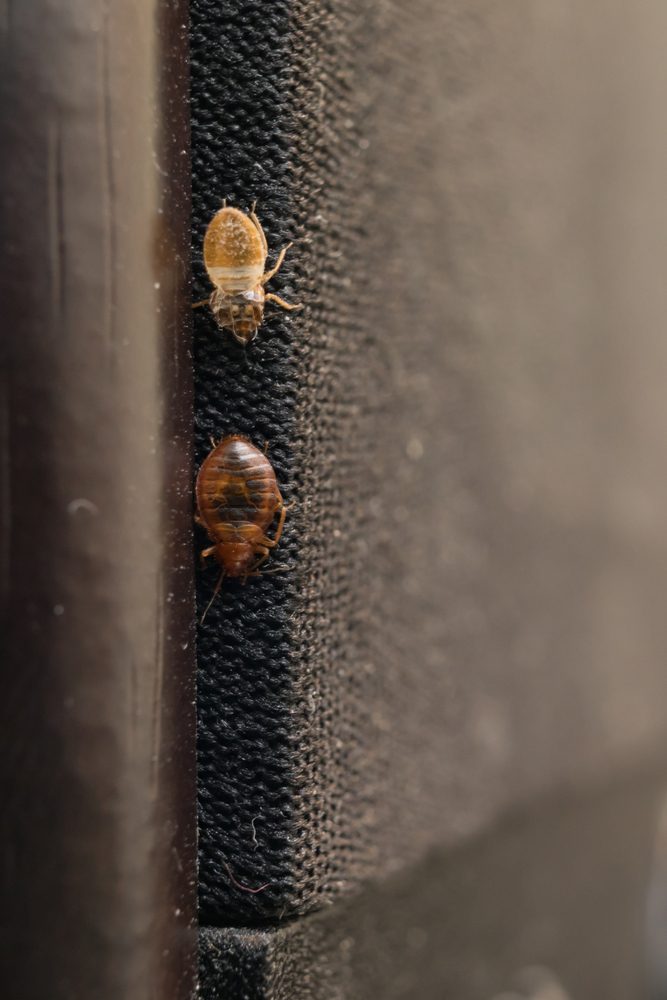Pictures of Different Bed Bugs
Bed bugs—they're back and in more places than you realize. Here's how to prevent bed bugs from infesting your house.
 Dmitrii Erekhinskii/Shutterstock
Dmitrii Erekhinskii/Shutterstock
Summer is the worst season for bed bugs, according to the National Pest Management Association. That makes sense as summer is the season for travel—which means you could pick up a bed bug while traveling and bring it home, or someone could bring the bugs to you when they come to visit. Here's how to how to prevent bed bugs from colonizing your house.
Stay on top of the vacuuming and dusting
While this may not be one of our tips on how to prevent bed bugs altogether, it is key to spotting the problem early and preventing a full-on infestation. Sadly, the cleanest home can still be infested: Bed bugs live where humans live and sleep—whether it's an immaculate a five-star hotel room or dirty dorm room. However, keeping a generally clean house will help you spot bed bugs before they become a major problem that could take months and a chunk of cash to get rid of says Jody Green, PhD, an urban entomologist at the University of Nebraska-Lincoln. "Housekeeping is a time to monitor and inspect and look for signs of bed bugs," says Green. Reducing clutter will also aid in monitoring and discovering bed bugs. If you need a hand decluttering, here's a simple guide.
Watch for these signs
When you change linens, says Green, inspect the mattress, box springs, and pillows for bed bug feces (they look like blotched ink spots), eggs, and the molted skins of the insects. Dust the nightstand or other pieces of furniture in the bedroom. Check any books, knick-knacks, or electronics on your nightstand. Finish up by vacuuming. Use a crevice tool to get in tight spots, and when you dump the vacuum, keep an eye out for bugs.
Prevent bed bugs from entering your home
You can pick up bed bugs from hotels, planes, trains, and even cabs; they'll climb into your bags or luggage. When you get home, resist the urge to unpack your luggage on your bed—in fact, don't even bring your luggage into the house until you have a chance to inspect it and clean it. Green uses a Clorox wipe to clean her hard case luggage. "I clean it and look for fecal stains, and if any eggs were laid on my luggage, they could be dislodged. It then gets stored in the basement on the shelf, "Green says. If by chance, a bed bug is overlooked, Green says, it is unlikely they will get through the door and to a bedroom from the basement or garage. Keep these things in mind to spot bed bugs in your hotel room.
Unpack with care
If the bed bug in your luggage is a female, she can lay eggs for an extended period of time without mating as long as she keeps getting a blood meal. For that reason, when Green arrives home from travel she only brings in the items she can wash and dry immediately, and she washes them in the hottest water and dries the clothes on the hottest setting for 30 minutes to be sure to kill bed bugs and their eggs. If the items can't be washed right away, she puts them in the dryer for 30 minutes before tossing them in the hamper. Inspect any hard items—toiletries, books, eyeglass cases, etc.—before bringing them back into the house. Do the same with backpacks, computer bags, and purses. Even if you think they're clear, you're better off not storing them in your bedroom: It's just too easy for an undiscovered bed bug to find you.
Don't forget about the office
Coats, purses, and lunchboxes that sit on desks could be a way for a bed bug to get from a co-worker's home to yours. "I would keep my personal belongings in a small plastic clear tote with a tight seal, and keep purses, bags, and outerwear off the ground," advises Green. It may not be a big issue at your office, but some jobs do have a higher risk, Green says. "People in social work or healthcare have a higher risk of picking up bed bugs because they go to various homes or transport people—it's about exposure." Learn what really causes bed bugs.
What about houseguests?
When visitors arrive at your house, be wary: "I do ask guests if they have had bed bugs or have been staying in a hotel or resort," says Green. "It may seem rude, but I feel like those are teaching moments. People keep bed bugs a secret because of the social stigma, but that only helps make it a bigger problem." Green puts her guests' belongings on a table in their room, and she doesn't let their belongings linger in her common areas. "If bed bugs are going to get out and bite, it will be the houseguest," she explains. Green also has pitfall traps on the legs of her bed to catch any stray bugs before they can get to her.
Yes, that sofa on the sidewalk could have bed bugs
A like-new sofa on the curb or a cheap, comfy recliner from the thrift store is hard to resist, but resist you should: The only way you're going to find out if the furniture is infested is to have a pro from a pest management company inspect the item. You could try your own inspections by using a flashlight and magnifying glass to thoroughly check for bed bugs, eggs, molted skins, and feces. You can further reduce your risk by cleaning the item with a commercial-grade steamer or Sterifab before bringing anything used inside.
Pictures of Different Bed Bugs
Source: https://www.rd.com/article/how-to-prevent-bed-bugs/